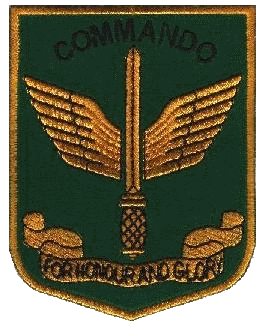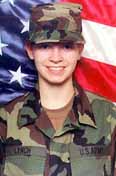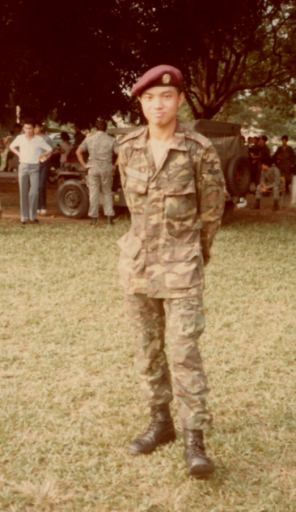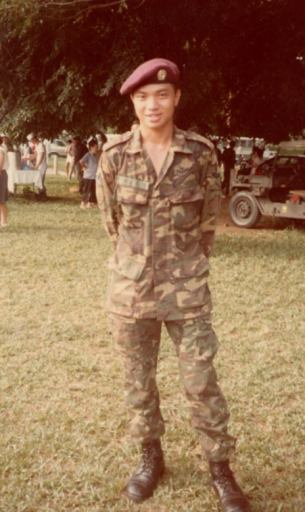| I hated tightening the strap across my chest. It made my chest feel uncomfortably congested, sometimes even interfering with my breathing. So one fine day, I conjured a brilliant idea. I decided not to tighten that strap. What was the harm? Now my chest would feel much more comfortable. Smart, wasn't I?
Upon jumping, my canopy was deployed, but before I could tilt my head up to check that my canopy had deployed (as was the standard procedure), something unexpected happened. The sudden upward momentum caused by the open canopy jerked the loosened strap up violently. The strap hit my chin hard. But there was no time for pain. I feared getting choked as my chin was forced up by the strap which felt like a hangman's noose. Fortunately, I could still breathe, although with some difficulty. (The irony of it all - I had thought that not tightening the strap would enable me to breathe more easily. I wasn't as smart as I had thought.) Now the danger was that I couldn�t see properly. Because the loose strap was forcing my chip up, my field of vision was limited. It was especially hard to look down; I was descending blindly. May God have mercy on my butt if there was anything sharp on the ground where I was landing. I managed to steer myself to a field. From the little that I could see, it was an open grassy field. But because of my limited vision, I couldn�t be sure. In a few seconds, I would touch ground. I hope there�s nothing sharp down there or my butt will hurt really bad. I braced myself for the worst as I waited for the impact. One . . . Two . . . Three . . . . My legs felt the forceful impact of hitting something. I rolled to the side as we were trained to do upon landing. I removed the sickening strap from around my chin. Then I stood to check if I was injured. I lifted my left leg; it felt fine. Lifted my right leg; felt fine too. I didn�t land on anything sharp. I had indeed landed on an open field. Thank God. Since then, I have learned my lesson. I tightened the chest strap before every jump. It was foolish of me to ignore instructions, foolish to choose an option for comfort's sake only. Habituation "The most dangerous are your 5th to 7th [I can�t remember the exact number; the sergeant might have said 4th to 6th] jumps, not the first few jumps," a sergeant warned. "You tend to be watchful during your first few jumps. Fresh from airborne school lessons, you remember all the procedures clearly, and so you execute them. But not so later. Many jumpers get injured on their 5th jump onwards.� I had always wondered why this was so. After army, while studying at Stanford University in 1995, I attended a psychology class by Professor Terry Winograd. I can�t recall the topic of discussion, but it was related to my following question. So I asked the class why the 5th to 7th jumps were more dangerous than the first few jumps. A man in his fifties (he was probably not a student taking the class for credit, but auditing for extra knowledge) talked about �habituation." He said that when a task becomes a habit, you tend to become less alert; you tend not to consciously follow the rules and procedures. I agree with him. I would add my own hypothesis: that after this slightly vulnerable period (may be 5th to 7th jump) and beyond, you become an �expert." That is when your skill level and experience becomes proficient, resulting in few injuries, even fewer than your first few jumps. But the middle zone (possibly 5th to 7th jump) remains dangerous because �habituation� has set in, but you are not yet an �expert." Hard Landing Ahead Now back to our army days. In our jumps, we tried to land on soft surfaces like grass or sand which would lessen impact upon landing. An instructor warned that bad landings caused ninety percent of all parachuting injuries. Fortunately, I had always landed on soft surfaces, mostly grass. That was going to change one day when we jumped over an airbase. Somehow my usual landing accuracy failed me, and I was about to land on a runway. Not having landed on a hard surface before, I braced myself for the worst. If I execute my roll perfectly upon landing, I should still be all right. (We are trained to roll upon landing to help absorb the impact.) But perfect I wasn't. Upon landing, instead of rolling, I let my hip hit the runway. I felt a slight pain that persisted to the next day. The medical officer gave me light duties for a day. That was the extent of my jump injuries. I am grateful to God for protecting me in all my parachute jumps. I was not a particularly skillful jumper, but I made it with only one minor injury. Many others were not so fortunate, as the next story shows. "Congratulations, Johnny!" Johnny's bunk bed was next to mine. He has one of the cooler heads in our company. He was a logical and rational person, not easily swayed by emotions. A devout Christian, he was also principled, standing by his beliefs firmly. One day in our bunk, we discussed gambling which was a common practice among army personnel. Neither of us gambled, but I asked him why he thought that gambling was wrong since gambling wasn�t explicitly forbidden in the Bible. He gave a very clear and well-reasoned answer. Vainly, I tried to poke holes into his argument, but each time he answered wisely to my rebuttals. So, he knew his values and convictions. Our company was divided into two batches for the airborne course. Johnny was in the batch that took the course first while I was in the second batch. On this morning, Johnny's batch had just returned to barracks after their very first training jump. We were excited. Clusters of men gathered. The second batch was eager to hear some �war stories� while the first batch was only too happy to share. �Yes, of course I was terrified." �No, I wasn�t afraid at all. I knew I would be fine." �I don�t believe you." �The landing was hard . . . .� �It was fun. I can�t wait for my second jump . . . .� I walked into my bunk to search for Johnny. I found him sitting quietly on his bed. He looked fine. He made it. I felt relieved. I asked him about the jump, expecting him to talk eagerly about his successful first jump. Instead, he sighed. After a few seconds of silence, he said slowly but deliberately, �I am injured." �You are injured?� �Yes, my legs." I couldn�t see his legs because my bed was blocking my view. So I moved nearer to him and to one side. His right ankle was in a big white cast which extended almost to his knee. �What happened?� I asked. He said he hurt his foot upon landing. His ankle was so badly hurt that the surgeon had inserted a screw to realign it. The screw would remain in his ankle for a year. He was thus out of commando training. �Everyone is congratulating me,� he said, sighing again. �You are injured, and everyone is congratulating you?� I said, not sure I was hearing right. I leaned forward. �Yes, everyone's congratulating me. They envy me for being out of the training, but they don�t realize that my injury is long term." I understood Johnny as well as those who congratulated him. The training was so demanding that many could think of nothing but relief from the present ordeal. Yet, Johnny, true to his logical self, had a point too. He may be spared the training, but he had to live with this injury which might remain long after our training was over. I didn't argue with him on this. I was slightly injured only once, landing on a runway as described above. I thanked God for protecting me through all my jumps. Airborne Video Clips Paratroopers jumping - 4 minutes. The way our U.S. counterparts jumped and the aircraft they used were similar to us. Airborne School - 3.5 minutes. Jump School - 4.5 minutes. Bad Jump Exits - 4 minutes. |
 |
| I'll be so happy if you could sign my guestbook.Thank you very much. |
| Five Days Without Sleep - and a 35 km march to round up a week of torture, to earn our corporal stripes. |

|
 |
| Commando's Prayer - Very meaningful prayer. Reveals the spirit of the commando. |
| Graphics by |
| Favorite Military Links - includes the Singapore Commandos and other Special Forces. |
| Barracks Haunting - The old commando barracks where we lived are reputed to be haunted. They were used as a POW prison during World War Two. Many prisoners died. Here are the stories as reported by the Singapore Paranormal Investigators. Click on "Haunted Changi" and scroll down to "Commando Barracks" |
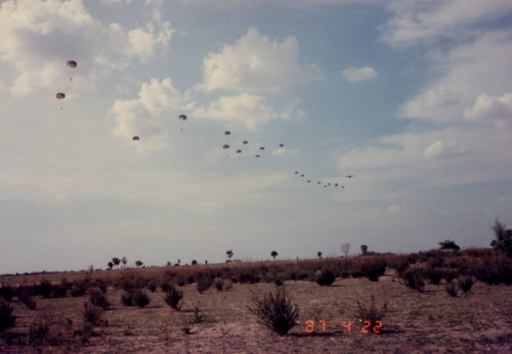 |
| Parachuting |
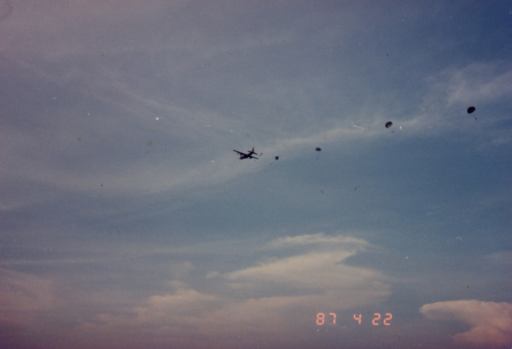 |
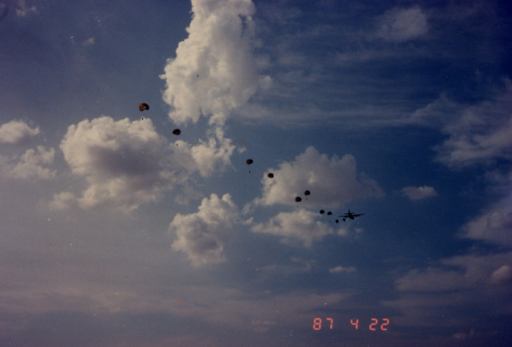 |
 |
| "Where is the prince who can afford so to cover his country with troops for its defence, so that ten thousand men descending from the clouds might not, in many places, do an infinite deal of mischief before a force could be brought together to repel them?" - Benjamin Franklin, 1784 |
| Parachute jumping was fun! It was a feeling like no other. The scenery below was beautiful. In the day, I saw tiny buildings, trees and hills, as if they were toy models. People looked like specks of dust. The night scenery was even more beautiful. Little lights were everywhere like Christmas lights in a big city. But instead of looking up to view the lights of buildings or fireworks, I looked down to view the lights below.
I felt exhilarated. Even though there were other jumpers, I felt all alone because the sky was a huge expanse. The feeling was different from that of looking out through the window of an airplane or helicopter. You were not protected in a man-made environment as you were in an air-conditioned jetliner. You saw the view all-around. Felt the rush of strong cold wind. My feet, instead of resting on solid ground, was dangling in mid-air. Felt much more in touch with the raw elements of nature. But I could enjoy the scenery for only a few seconds because danger lurked everywhere. I had a few nervy parachuting near accidents. One can never be too careful. Constant vigilance and adherence to procedures are a must. Near Collision I had to be careful not to collide with other jumpers. When within twenty-five yards of each other, we were trained to shout "steer away!" to warn the other jumper. Once, I heard a loud "STEER AWAY!" I looked all around but could see no one. All I saw was the reassuring sight of my white silk canopy above. Must have been my imagination. So I continued merrily on my way and eventually landed safely. After the jump, a fellow jumper, a medic specialist nicknamed Rubbish, asked in a concerned tone, "Didn't you hear me shout, 'steer away'?" "Oh, so it was you. Yes I did but couldn't see anyone." "I was very near your canopy. In fact, I was right on top of it. I was so close that I had to kick it to steer away!" Only then did I realize why I couldn't see him. He was right on top of me, and my canopy had obstructed by view. That was a close call. We could have collided. (In case you are wondering, the nickname Rubbish was given him because personal cleanliness was not one of his priorities. Everyone called him Rubbish, even one of our trainer sergeants. He wore the same uniform for days before changing to a new pair. He was a loyal friend though and we got along.) Jumper with Two Parachutes Deployed On another day, a group of us had just finished jumping and were watching other jumps. We saw a jumper with two parachutes deployed - the bigger main chute and the smaller reserve chute. "Look!" Our jump instructor pointed at the spectacle. "That guy must have panicked and accidentally activated his reserve chute when there was nothing wrong with his main chute. A dangerous thing to do. See, with both parachutes activated, he's not able to control where he's going. He's just oscillating downwards." That was why we were supposed to hold our hands tightly to our reserve chute when we exited the aircraft and not let our arms and hands swing about carelessly, possibly activating the reserve chute accidentally. That lesson had been ingrained in me ever since. Never activate your reserve chute unless you really need to. Unfortunately, like the jumper with two chutes deployed, I was to make a mistake myself with potentially deadly consequences as the next story shows . . . Choked in Mid-Air When fitting on our parachute harnesses, we were instructed to tighten all the straps: one strap on each thigh, and one across the chest, right above the reserve parachute. (See chest strap picture.) |
| I wish I had wings like these angels, so I wouldn't need a parachute. |
| Parachuting abroad, April 22 1987, |
| Parachuting abroad, April 22 1987, |
| Parachuting abroad, April 22 1987, |
 |
| Angel watching over me as I jump. |
 |
| My Army Picture Album (a separate website I created for pictures) |
 |
| My Tribute to RSM Sam Choo - He was a much respected commando. |
 |
| Army Memories - An assortment of short stories. |
| Quest for the Black Belt - As part of the exam, I had to fight a seasoned Black Belt fighter called "The Bull." Could I overcome him? |
| My Tribute to a Fallen Lieutenant - He did something which made others bitter but made me appreciate and respect him even more. I miss him. Farewell, Lieutenant Sir. |
| A Mountain After Another - We had just finished scaling a gigantic mountain. Could anything worse be waiting for us? |
| Heat Exhaustion deep in the hot and humid tropical jungle. |
| Water Miracle - "God, I am dehydrated. I need water badly. HELP." |
| Unarmed Combat - "Kill Kill Kill!" we yelled as we fought |
| How I got stitched without anesthetics as a result of a martial arts fighting accident. |
| Our Red Beret Presentation, which officially made me a commando |
| Commando Interview - How a frail, skinny, colour-blind boy with a fractured arm got into a commando unit. |
| "The secret of the Paratrooper's success can be summed up in three words; comradeship, esprit de corps & efficiency"
- Major Rudolf B�hmler, German paratrooper in WW2, Cassino. |
| More Army Stories |
| Angel checking if my heart was still beating after a parachute jump ordeal. |
| My Army Picture Slideshow at youtube. |
 |
 |
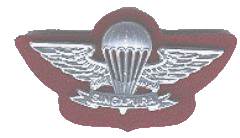 |




